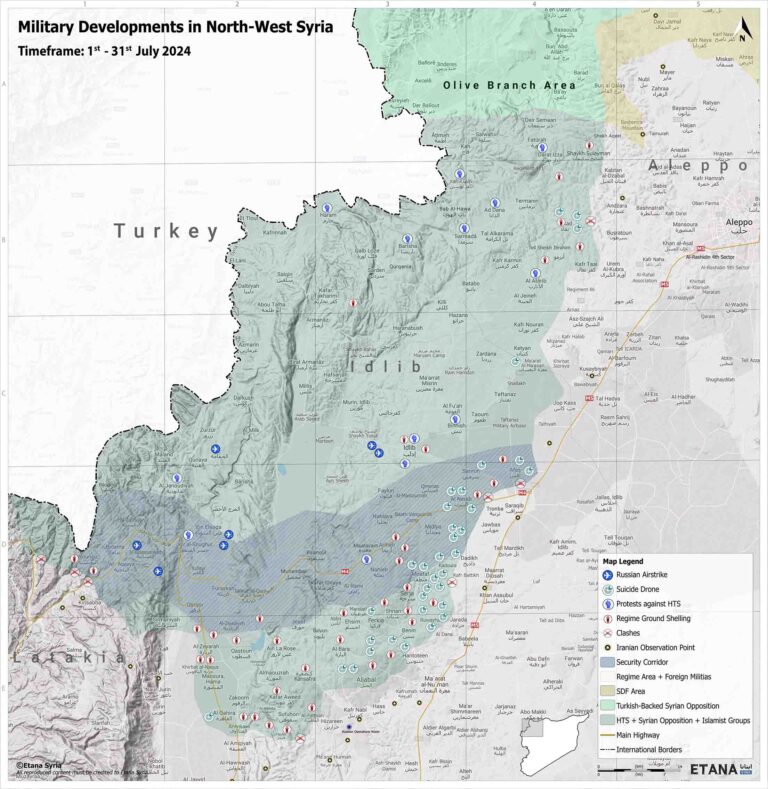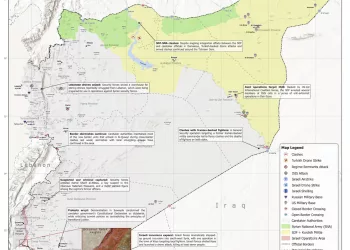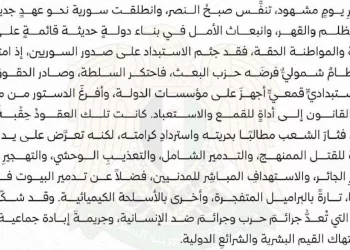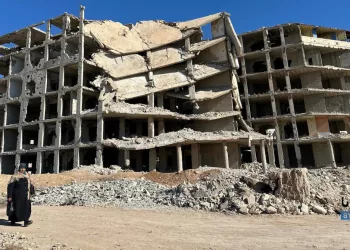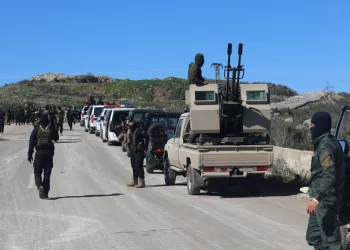A sustained protest movement is unsettling areas controlled by the Turkish-backed Syrian National Army (SNA) across north-west Syria. Syrians in the north-west, angered by xenophobic pogroms against Syrians in Turkey in late June and early July, Ankara’s recent opening of the Abu al-Zendayn crossing with regime-held areas, and the lethal response by Turkish forces to Syrian counter-protesters earlier in the month, continue to hold regular demonstrations and sit-ins across the region. Demonstrators have even presented a list of demands to Turkish authorities that includes accountability for shootings of protesters in early July and the rejection of steps toward normalization with the Assad regime.
Protests in North-west Syria
In early July, violent counter-protests erupted across north-west Syria—including in Abyan Saaman, Al-Abzimu, Afrin, Atarib, Azaz, Al-Bab, Kafr Nouran and Twameh—with hundreds of Syrian demonstrators tearing down Turkish flags, hurling rocks at Turkish trucks and attempting to storm the Jarablus crossing. The Turkish military responded with live fire and tear gas, resulting in the deaths of at least seven Syrians.
Although the current protest movement was sparked on 1st July following the killing of several Syrians by Turkish forces in Afrin and near the Jarablus crossing, the causes of public anger are rooted in several areas of Turkish policy in the north-west. They include perceptions of widespread racism and rights abuses against Syrians living in Turkey; the opening of a new commercial border crossing with regime areas at Abu al-Zendayn; and growing signs that Turkey’s leadership is taking steps towards normalizing relations with the Syrian regime. The opening of Abu al-Zendayn, a long-shuttered commercial crossing linking regime-controlled Aleppo to the opposition-held city of Al-Bab in late June was widely interpreted in Syria and the region as a step by Ankara towards normalization with the Assad regime, particularly after several statements by President Recep Tayyip Erdogan in recent weeks signaling his openness to restoring diplomatic relations in some form.
Notably, Idlib has not witnessed any protests against Turkish policies. Hay’at Tahrir al-Sham (HTS) reinforced military positions at the Bab al-Hawa crossing and preemptively closed it to avoid a repeat of the incidents at the Bab al-Salameh crossing in Azaz in early July, where protesters stormed the crossing and took down the Turkish flag.
Following the initial outburst of violent anger and protest on 1st July, public protests continued across SNA-controlled areas in July—admittedly at a lower intensity, but persistently taking aim at Turkish authorities and demanding key policy changes. Regular Friday demonstrations, involving hundreds of people, continue to take place across the region, in addition to coordinated sit-ins in Afrin, Azaz, Al-Bab and Marea on other days of the week. The movement has continued to organize and spread in recent weeks, collectively referring to itself as the “Dignity Sit-Ins.”
The protests have faced criticism by some Syrians for lacking clear and realistic demands. However, organizers have gradually coalesced around a list of six broad objectives, principally demanding Turkish authorities:
- Conduct a judicial investigation into shooting incidents during the 1st July counter-protests & compensate the victims’ families;
- Reject further steps towards normalization with the Assad regime and halt opening more commercial border crossings with regime areas;
- Limit Turkish activity in north-west Syria to maintaining military bases without interference in local administration;
- Cease violations against Syrian refugees in Turkey and fulfil their legal responsibilities toward displaced Syrians in Turkey;
- Dissolve the Syrian National Coalition (SNC) and all its affiliated bodies—including the interim government, constitutional committee and negotiations commission;
- Form a supreme body to represent and lead the Syrian opposition.
The protest movement has presented many SNA factions with a difficult choice. While popular sentiment among the Syrian population in north-west Syria has been largely supportive of the protests, and anger against Turkish authorities a palpable driver of events, most groups remain highly dependent on the Turkish government for political, financial and military support.
Russian & Regime Activity
Regime forces and affiliated militias continued regular barrages of machine-gun fire, guided missiles and artillery against opposition-held areas last month. Targets included civilian sites in Idlib, Aleppo, Hama and Latakia provinces. In total, three civilians were killed and 19 others injured. Regime forces and Iranian-backed militias also continued to launch frequent drone strikes on civilian areas across the north-west. In recent weeks, dozens of suicide drones have attacked the towns of Efes, Kafranbel, Ma’arat Nu’man and Neirab.
In addition to regime shelling, Russian warplanes struck several towns in southern Idlib, causing 11 injuries and destroying numerous buildings, including a local secondary school.


